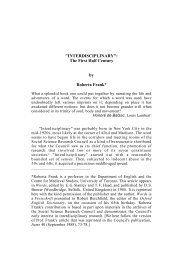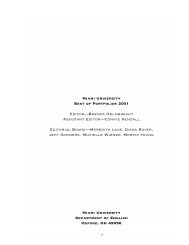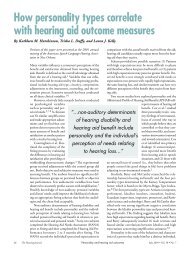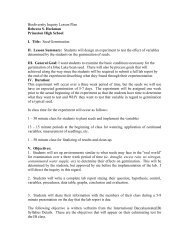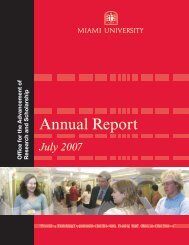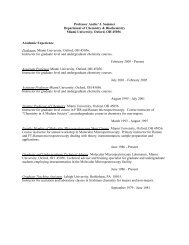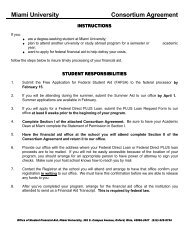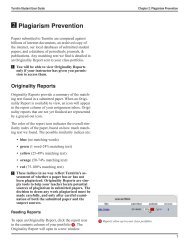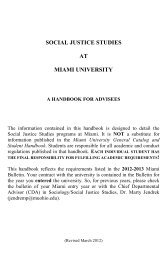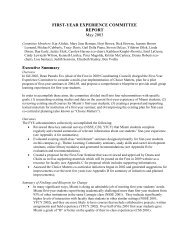Interdisciplinary Research Manual - Units.muohio.edu
Interdisciplinary Research Manual - Units.muohio.edu
Interdisciplinary Research Manual - Units.muohio.edu
You also want an ePaper? Increase the reach of your titles
YUMPU automatically turns print PDFs into web optimized ePapers that Google loves.
13<br />
whole, then on a particular topic. Instead of ignoring a second book with a similar title,<br />
see if it is coming at the same topic from a different perspective; e.g., books on the same<br />
environmental policy may be written by political scientists or by natural scientists, and<br />
both perspectives are important. Remember that the literature review is much harder than<br />
the annotated bibliography, and it becomes easier if you’ve done a good job of<br />
categorizing topics and a thorough job of finding the key books for each topic and for<br />
each perspective on a topic. If you don’t, you’ll discover that you need to stop work on<br />
the lit review to go back and redo that part of your annotated bibliography before you can<br />
continue.<br />
Precision becomes important when you work on your annotated bibliography. The<br />
slightest error in copying down the call number, and you won’t find it when you go to the<br />
shelves. An error in identifying the perspective of an author can really throw you off later<br />
when you write your lit review. Even an error in copying down a quote from the book<br />
that sets out its approach can come back to haunt you because you may well end up using<br />
that quote in your project, and you don’t want to waste time later on rechecking quotes—<br />
get them right the first time.<br />
If you cannot keep yourself from reading the books, then decide how many books<br />
you need to evaluate in a day, follow your system (See end of Evaluating Sources for<br />
how to develop a system) ruthlessly each day to evaluate that many books, and then in<br />
your free time later in the day, you can read to your heart’s content, and long as you’re on<br />
pace to complete your annotated bibliography on time.<br />
The results. Each year, one or two seniors make the scary discovery that<br />
“Someone else has already written my project.” If that happens, don’t let it faze you. You<br />
need to realize that’s not a problem, because research is an on-going process of<br />
exploration. Every time a step is completed in the research process, new opportunities<br />
open up. There’s always a next thing to do, a next step. If someone has written your<br />
project already, that means you will be able to deal with the topic at a more sophisticated<br />
level. Someone else has already done the initial spadework for you, and you can build on<br />
it. So there is no such thing as being “scooped” the way a journalist can be. Your initial<br />
response is probably that someone has beat you to it so now you have to find a new topic,<br />
but that’s simply wrong. Someone beat you to the lower-level stuff so now you can focus<br />
on higher-level stuff that’s more interesting. Be glad someone else wrote your project<br />
already. Whatever you do, don’t panic. Say ‘thank you’ and seize the opportunity to treat<br />
the topic at a more advanced level.<br />
Most seniors, however, decide to modify the topic for their senior project in light<br />
in the topics that other scholars have written on. That may also happen as you write the<br />
literature review, outline your project, or write your first chapter. It is part of the normal<br />
evolution of your topic as you become more knowledgeable about what else has been<br />
written in your field. It reflects your willingness to learn and, as such, it is something to<br />
feel good about, not something to worry about.<br />
Annotated bibliographies are a useful tool. The annotations are there to serve you.<br />
An initial annotated bibliography is assigned to get you started (and show you how to do<br />
it), but every year seniors routinely continue work on their annotated bibliographies well<br />
into second semester, even though they’re not getting a grade on it and no one is telling<br />
them to do it or looking over their shoulder to make sure they do it; indeed, in most cases,<br />
the bibliography in their final project is not even annotated. The reason you need an



